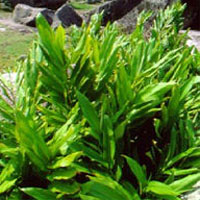Ginger
 © Steven Foster
© Steven FosterHow It Works
The dried rhizome of ginger contains approximately 1–4% volatile oils. These are the medically active constituents of ginger and are also responsible for ginger’s characteristic odor and taste. The aromatic constituents include zingiberene and bisabolene, while the pungent constituents are known as gingerols and shogaols.1 The pungent constituents are credited with the anti-nausea and anti-vomiting effects of ginger.
In humans, ginger is thought to act directly on the gastrointestinal system to reduce nausea.2 Ginger has been shown to reduce the symptoms of motion sickness associated with travel by boat and, to a lesser extent, car.3, 4, 5 Two double-blind clinical trials have found that ginger may reduce nausea due to anesthesia following surgery,6, 7 although one trial could not confirm this benefit.8 A preliminary trial has suggested ginger may be helpful for preventing chemotherapy -induced nausea. 9
While ginger is a popular remedy for nausea of pregnancy, it has only been clinically studied for very severe nausea and vomiting known as hyperemesis gravidarum.10 This condition is life threatening and should only be treated by a qualified healthcare professional. Because ginger contains some compounds that cause chromosomal mutation in the test tube, some doctors are concerned about the safety of using ginger during pregnancy. However, the available clinical research, combined with the fact that ginger is widely used in the diet of certain cultures, suggests that prudent use of ginger for morning sickness is safe in amounts up to 1 gram per day.
Ginger is considered a tonic for the digestive tract, stimulating digestion and toning the intestinal muscles.11 This action eases the transport of substances through the digestive tract, lessening irritation to the intestinal walls.12 Ginger may protect the stomach from the damaging effect of alcohol and non-steroidal anti-inflammatory drugs (NSAIDs, such as ibuprofen) and may help prevent ulcers.13
Ginger also supports cardiovascular health. Ginger may make blood platelets less sticky and less likely to aggregate.14, 15 However, not all human research has confirmed this.16, 17
How to Use It
For prevention or treatment of motion sickness, 500 mg of dried ginger powder can be taken one-half to one hour before travel, and then 500 mg every two to four hours as necessary. Children below the age of six should use one-half the adult amount. For the treatment of nausea associated with pregnancy, women can take up to 1 gram daily,18 but should only use ginger for symptomatic relief of nausea and not on an ongoing basis. Ginger may potentially be used for nausea associated with anesthesia or chemotherapy, but only under the supervision of a physician.
Copyright © 2026 TraceGains, Inc. All rights reserved.
Learn more about TraceGains, the company.
The information presented by TraceGains is for informational purposes only. It is based on scientific studies (human, animal, or in vitro), clinical experience, or traditional usage as cited in each article. The results reported may not necessarily occur in all individuals. Self-treatment is not recommended for life-threatening conditions that require medical treatment under a doctor's care. For many of the conditions discussed, treatment with prescription or over the counter medication is also available. Consult your doctor, practitioner, and/or pharmacist for any health problem and before using any supplements or before making any changes in prescribed medications. Information expires December 2026.














